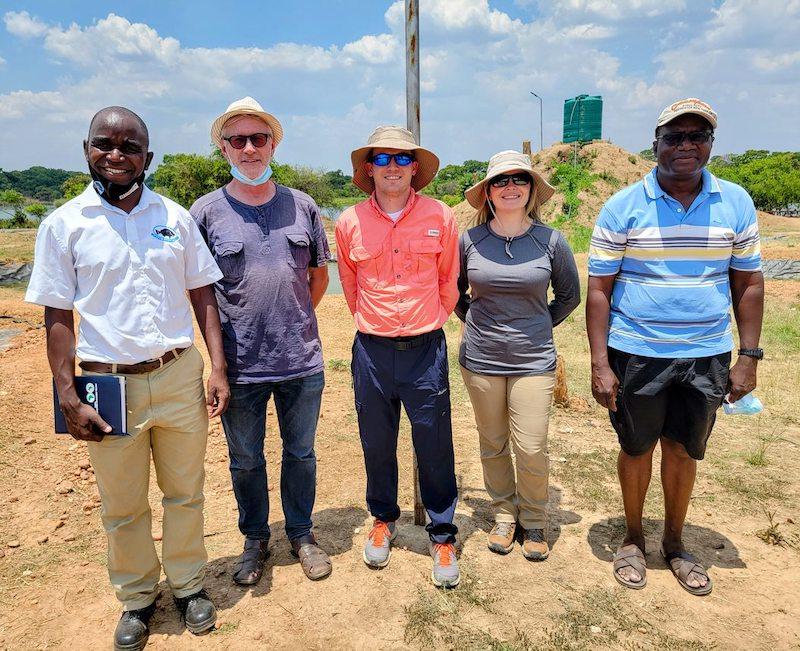
Stephen Reichley and Amanda Rowe visit Mukasa Agrosolutions Fish Farm in Zambia. Pictured from left: the owner of Mukasa Agrosolutions Fish Farm, Øystein Evensen of the Norwegian University of Life Sciences, Reichley, Rowe, and Bernard Hang’ombe of the University of Zambia. (Photo submitted by Stephen Reichley)
By Alaina Dismukes
Amanda Rowe, class of 2023 Mississippi State University veterinary student, experienced aquatic research firsthand as a part of an international internship with the Global Center for Aquatic Health and Food Security (GCAHFS), with travel scholarship support from the College of Veterinary Medicine.
The internship program leverages MSU’s and the GCAHFS’ aquatic health and food security expertise as well as their vast network of collaborators and placed Rowe with a Feed the Future Innovation Lab for Fish research project.
The Florida native traveled to Zambia in the fall of 2021 with Stephen Reichley, GCAHFS associate director and assistant clinical professor in the College of Veterinary Medicine Department of Pathobiology and Population Medicine. There, Rowe and Reichley worked with Zambian researchers to understand diseases impacting tilapia in the country and help develop a vaccine to address them.
“The Fish Innovation Lab, and its many research projects, offers MSU CVM veterinary students the opportunity to gain research experience and to do so in an international setting,” Reichley said. “Students who participate in international experiences grow professionally and personally from the trips. In addition to that growth, the students are able to gain valuable research experience that is oftentimes quite different than the research they may experience in the U.S. The availability of resources and facilities can be different in developing countries and participating in research in these environments give students lifelong skills.”
Rowe spent four weeks in Zambia as part of the international internship program. She was able to get academic credit for the experience through an International Aquatics Advanced Clinical Rotation, available to MSU veterinary students.
“The first two weeks I traveled around Zambia with Dr. Reichley, Dr. Hang'ombe, and others from both Zambia as well as a group from the Norwegian University of Life Sciences who were there at the same time,” Rowe said.
Visiting different farms provided various opportunities for Rowe to learn about and analyze tilapia aquaculture in Zambia.
“We traveled to different farms and collected information about aquaculture operations, and we also collected samples,” she said. “For example, we collected fish eggs, fry, and fingerling (which are small, young fish) samples from a farm that was having a problem with fingerlings displaying odd behaviors and then dying.”
The second half of her trip was spent in the lab. There, she developed her skills further by processing samples and running analyses.
“I was able to work with every aspect of my project from the ground up,” Rowe said. “I drew blood to make my own blood agar plates for bacterial growth, which is typically purchased pre-mixed in the U.S.”
Her time in Zambia provided her with a mix of research opportunities as well as cultural immersion.
“In addition to my research project, I helped in the lab with other tasks such as helping with the daily processing of samples,” Rowe said. “I also spent time in the lab conversing with my lab mates, who ranged from students to faculty members. I learned so much from each one of them. They all took the time to ensure I understood every step of the process and why it was important.
“Also, the farmers were open about their operations and extremely helpful with their explanations. Dr. Reichley ensured I worked through the problems facing the farms and understood the ‘why’ behind the production issues facing the farmers and how they could be resolved.”
Rowe said the trip did more than advance her skills in aquatic veterinary medicine.
“I grew on a personal level during this trip,” she said. “It expanded my worldview and exposed me to a dramatically different culture than my own. Everyone I dealt with was kind, warm, and welcoming. I would love to return to Zambia one day and continue work on this project.”
Reichley said MSU’s Fish Innovation Lab benefited greatly as well from Rowe’s involvement in the project and her help in accomplishing critical research goals.
“She approached the research question and tasks from a different perspective than those in Zambia,” he said. “Different thoughts and perspectives are important as we help tackle the important issues society faces today concerning aquatic health and food security.”
For more information about the Global Center for Aquatic Health and Food Security internships, click the link: https://bit.ly/GCAHFSInternship. For more information on the College of Veterinary Medicine study abroad programs, follow this link: https://www.vetmed.msstate.edu/academics/international-programs/study-abroad.
Published June 20, 2022